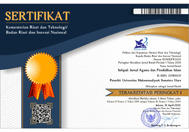Pembelajaran Berbasis Media TikTok dalam Penerapan Budaya Malu Pada Siswa Kelas V Sekolah Dasar
Abstract
Technology cannot be separated from everyone's lives with the development of technology, the greater the influence of the world, both negative and positive, a person must be able to keep up with technological developments. The use of technology must be optimal, for example in the world of technology education, the available applications can be utilized very well in order to help in the learning process. The purpose of the study is to find out that the tiktok application can be used for cultural education of shyness of students. The method used is a descriptive qualitative research method with interview data analysis techniques, observation and documentation. The results of tiktok media in the application of shame culture get positive results students do not follow bad deeds such as dancing, using inappropriate words, students use the tiktok application to learn to draw, sing, and make rhyme videos, poems and others.
Keywords
Full Text:
PDFReferences
Adawiyah, D. P. R. (2020) ‘Pengaruh Penggunaan Aplikasi TikTok Terhadap Kepercayaan Diri Remaja di Kabupaten Sampang’, Jurnal Komunikasi, 14(2), pp. 135–148. doi: 10.21107/ilkom.v14i2.7504.
Batoebara, M. U. (2020) ‘Aplikasi Tik-Tok Seru-Seruan Atau Kebodohan’, Jurnal Network Media, 3(2), pp. 59–65. doi: 10.46576/jnm.v3i2.849.
Jayanata, G. (2022) ‘Dampak Media Sosial TikTok Terhadap Perilaku Siswa Sekolah Dasar Negeri 42 Di Desa Padang Peri Kecamatan Semidang Alas Maras Kabupaten Seluma’, Pendidikan Guru Madrasah Ibtidaiyah Fakultas Tarbiyah dan Tadris UIN Fatmawati Sukarno Bengkulu, pp. 1–79.
Mulyana, D. et al. (2020) ‘Communication, Management and Humanities’, IJCoMaH, 1(2), p. 193.
Nora Handeska Putri (2021) ‘Rasa Malu Dalam Media Sosial TikTok’, Universitas Islam Negeri Sunan Ampel. Available at: http://digilib.uinsby.ac.id/48955/2/Nora Handeska Putri_E95217036.pdf.
Rahardaya, A. K. and Irwansyah, I. (2021) ‘Studi Literatur Penggunaan Media Sosial Tiktok Sebagai Sarana Literasi Digital Pada Masa Pandemi Covid-19’, Jurnal Teknologi Dan Sistem Informasi Bisnis, 3(2), pp. 308–319. doi: 10.47233/jteksis.v3i2.248.
Sholikhah, A. (2016) ‘Statistik Deskriptif Dalam Penelitian Kualitatif’, Komunika: Jurnal Dakwah dan Komunikasi, 10(2), pp. 342–362. doi: 10.24090/komunika.v10i2.953.
Siahaan, C., Laia, A. P. and Adrian, D. (2022) ‘Studi Literatur: Media Sosial “Tiktok” Dan Pembentukan Karakter Remaja’, Jurnal Ilmiah Indonesia, 7(4).
Sihotang, T. D. O. (2017) ‘Dampak Negatif Tiktok Di Masa Pandemic’, Universitas Lambung Mangkurat.
Solihah, I. and Asikin, I. (2021) ‘Nilai-nilai Pendidikan Akhlak Terkait Keutamaan Rasa Malu dalam Kitab Adab Riyadhush Shalihin’, Jurnal Riset Pendidikan Agama Islam, 1(1), pp. 57–62. doi: 10.29313/jrpai.v1i1.222.
Yunizar, F. (2019) ‘Menumbuhkan Rasa Malu (Shame) Dalam Menanggulangi Kenakalan Remaja di Lembaga Pendidikan’, al-Bahtsu, 4(2), pp. 187–192.
DOI: https://doi.org/10.30596/10605
Refbacks
- There are currently no refbacks.
Intiqad Jurnal Agama dan Pendidikan Islam is abstracting & indexing in the following databases:
View My StatsEditorial Address:
Faculty of Islamic Religion, Universitas Muhammadiyah Sumatera Utara. Jl. Mukhtar Basri No. 3 Medan 20238 Telp. (061) 6622400 ext. 27 dan 28 Fax. (061) 6625474. e-mail: intiqad@umsu.ac.id

























